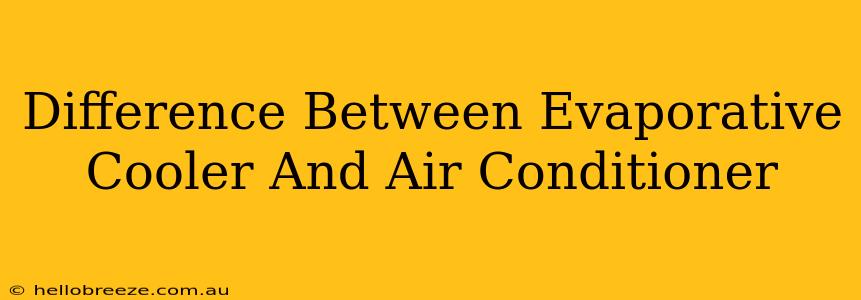Choosing between an evaporative cooler and an air conditioner can be tricky. Both aim to cool your home, but they achieve this in vastly different ways, leading to significant differences in performance, cost, and suitability for various climates. This article breaks down the key distinctions to help you make the right choice for your needs.
How They Work: The Core Difference
The fundamental difference lies in their cooling mechanisms:
Evaporative Cooler (Swamp Cooler):
Evaporative coolers work by evaporating water. Hot, dry air is drawn into the cooler, where it passes over a wet pad or filter. As the water evaporates, it absorbs heat from the air, resulting in cooler air being expelled. Think of it like sweating – evaporation cools your skin. This method is highly effective in hot, dry climates.
Air Conditioner:
Air conditioners use a refrigerant to cool the air. A compressor circulates refrigerant through a system of coils, absorbing heat from the indoor air and releasing it outside. This process doesn't add moisture to the air, making it ideal for humid climates.
Key Differences Summarized:
| Feature | Evaporative Cooler | Air Conditioner |
|---|---|---|
| Cooling Method | Evaporative cooling | Refrigerant cooling |
| Climate Suitability | Hot, dry climates | Any climate, especially humid climates |
| Humidity | Increases humidity | Decreases humidity |
| Energy Efficiency | Generally more energy-efficient (in dry climates) | Generally less energy-efficient |
| Cost | Lower initial purchase cost | Higher initial purchase cost |
| Maintenance | Requires regular cleaning and water refills | Requires less maintenance, but professional servicing may be needed |
| Air Quality | Can improve air quality in dry climates by adding moisture | Doesn't affect air quality significantly |
Which One is Right for You?
The best choice depends on your climate and preferences:
Choose an evaporative cooler if:
- You live in a hot, dry climate.
- You're on a budget and prioritize lower initial cost.
- You prefer a more natural cooling method.
Choose an air conditioner if:
- You live in a humid climate.
- You need precise temperature control.
- You prioritize consistent cooling, regardless of outside humidity.
- You're less concerned about energy consumption or initial costs.
Beyond the Basics: Additional Considerations
-
Space: Evaporative coolers tend to be larger than window air conditioners, requiring more floor space. Central air conditioning systems require even more space for ductwork.
-
Noise levels: Evaporative coolers generally produce less noise than air conditioners.
-
Installation: Evaporative coolers are generally easier to install than central air conditioners. Window units are easier to install than both.
In conclusion: Understanding the core differences between evaporative coolers and air conditioners is crucial for making an informed decision. Consider your climate, budget, and cooling needs to select the system that best suits your home and lifestyle. Don't hesitate to consult with HVAC professionals for personalized recommendations.

